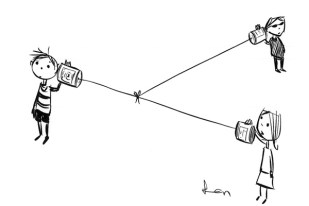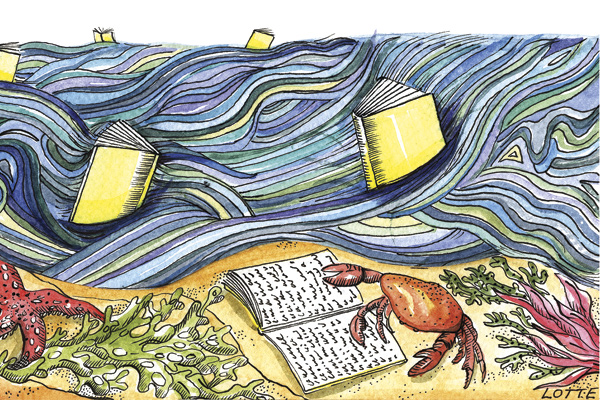Mary Killen
Gone Girl by the American writer Gillian Flynn comes recommended by both high- and middle-brow readers (Orion, £7.99). I want the reported total absorption from the off and the welcome relief from thinking about anything other than what’s on the next page.
The Blue Riband, Peter York’s anecdotal history of the Piccadilly Line (Penguin, £4.99) is ideal for lounger life as almost every sentence is interesting, stylish and witty, and you can read it aloud at random to pool mates too lazy to hold a book up themselves. Gerard Manley Hopkins’s Poems and Prose (Everyman’s Library Pocket Poets, £9.99). Just focus on learning by heart, say, three poems per holiday. They will stand you in good stead, not just as party pieces but for when you’re stuck in lifts or traffic.Matthew Parris
I’m only a few pages into Snug, by Matthew Tree (AK Digital, £12.62) and I know already I shall sail through it. Tree somehow thinks like me: writer and reader fit. It’s a first novel and I can tell it’s going to be ambitious in its resolve to be both serious and funny. And I’m intrigued by an author venturing at last into his own mother tongue: living in Barcelona — where he’s widely known and published — Tree has written only in Catalan for the past two decades.
Meanwhile, I’m but a few chapters from the end of Romola, George Eliot’s most difficult novel. This, too, was a tremendously ambitious venture — to relive the life of 16th-century Florence — and I don’t think it quite works; but I adore Eliot’s mind, and when I’m old and useless I shall assemble from all her work a treasury of her finest passages. Finally I want to re-read at leisure a memoir I raced through in May for a Spectator review: Last Man In (Neville & Harding, £20). John Hare was the last entrant into the British colonial service in Northern Nigeria. Wonderful stuff, full of adventure, lyricism and humour. I want to savour every page.Hugo Rifkind
For reasons of self-improvement, I’ll be reading Jesse Norman’s Edmund Burke (Collins, £20), because everybody says I ought to, and Julian Assange’s Cypherpunks: Freedom and the Future of the Internet (Or Books, £8.99), because I’ve started it a few times and always sighed a bit and put it down again. Theoretically it ought to be more readable than most things Assange writes, because he’s laid it out as dialogues with other people. Like Plato did, with Socrates. Because he’s humble like that.
For fiction, I’m looking forward to Neil Gaiman’s The Ocean at the End of the Lane (Headline, £16.99). He’s hardly heavy going, but he’s the master of fantasy and realism twisted together and, considering it’s probably going to be raining, I’d rather be in one of his worlds than my own.Melissa Kite

The Dinner by Herman Koch (Atlantic Books, £7.99). My mother and I will go through about a dozen thrillers as we lounge on our sunbeds in southern Italy. We compete to see who can bring the most gruesome tale in their suitcase. This was recommended to me by the lady in my local bookstore in Cobham.
The Stand by Stephen King (Hodder, £9.99). I have been rediscovering this author by reading some of the longer books I neglected as a teenager. I have just finished the subtly strange Hearts in Atlantis. I love the fact that he defies definition. When does popular fiction become classic fiction? To me, King is as successful a storyteller as Dickens. Margaret Thatcher: The Authorised Biography, Volume I by Charles Moore (Allen Lane, £30). I read at least one political tome per holiday and my friends at Westminster tell me this one is excellent. Northern Dancer: The Legend and His Legacy by Muriel Lennox (Mainstream Publishing, £7.99). I bought a thoroughbred filly on a whim last year. She is a great, great grand-daughter of Northern Dancer. It’s an amazing privilege to own a piece of thoroughbred history, even if she is eating me out of house and home. I’ve been reading everything I can about her bloodlines, the magic of racing and what makes a winner.Martin Vander Weyer
For education I’ll tackle Progressive Capitalism (Biteback, £20), billionaire ex-grocer David Sainsbury’s thesis on ‘how to achieve economic growth, liberty and social justice’ — with the state in an enabling role, ‘rather than the command-and-control role of traditional socialism or the minimalist role of neo-liberalism’. Sounds like another jog along the Third Way, but I’m hoping for better from New Labour’s former science minister.
For pleasure, I’ve chosen Sarah Churchwell’s Careless People: Murder, Mayhem and the Invention of the Great Gatsby (Virago, £16.99), an analysis of every ingredient of Scott Fitzgerald’s 1925 masterpiece — to which Baz Luhrmann’s new film is distantly related. For another angle on the same era, I’ll try John Dos Passos’s Manhattan Transfer, also 1925, though his experimental style may defeat me. If it does, I’ll turn to P.G. Wodehouse’s Ukridge (1924), whose anti-hero is always on the look out for ‘a quick buck… or at least a plausible little scrounge’.Taki
The Pike by Lucy Hughes-Hallett (Fourth Estate, £25). This will be the third biography of the tiny Italian Gabriele d’Annunzio, who seduced way above his weight and was the father of fascism. Anyone who could change his name aged 11 to a more heroic one is worth reading about again and again.
Opposite Attraction by Julie Gilbert (Pantheon Books) about Erich Maria Remarque and Paulette Goddard. They were lovers and also married. He wrote All Quiet on the Western Front and sold so many copies that Thomas Mann stopped speaking to him. The Nazis called him a Jew, which he was not. Goddard was a real piece of you know what, smart, sassy and infamous for that thing under the table with Charlie Chaplin. Heroic times — and two good people who also dressed beautifully. Light Years by James Salter (Penguin Classics, £9.99). He is a modern Scott Fitz-gerald and this novel traces a brilliant marriage and the cracks which appear in it. A classic novel written 30 years ago, seductive and nuanced. None of this Salman Rushdie bullshit.James Delingpole
If they don’t take me over my weight limit I would like to read Anna Karenina — because War & Peace is the best novel I’ve read, and I hear this is even better. And Vasily Grossman’s Life and Fate (Vintage Classics, £9.99) — like War & Peace set in the second world war, apparently. I discovered Grossman through his brilliant war diaries, which Antony Beevor edited.
Also Christopher Booker’s The Seven Basic Plots (Continuum, £17.99). A wise, discursive, utterly fascinating masterpiece, I am told, which tells you not just about narrative and literature but the meaning of life itself. For lighter reading Derek Robinson’s Goshawk Squadron (MacLehose Press, £8.99) because, as he showed with Piece of Cake, Robinson is probably the best novelist ever to write about fighter combat: surprising, hyper-realistic and very, very dark.Jeremy Clarke
I don’t expect to pick up any reading material from start to finish of my holiday except the in-flight magazine. If I was going on holiday tomorrow morning, however, I would take Diary of a Mad Old Man by Junichiro Tanizaki (1966) and Elephant Bill by J.H. Williams (1950), both bought on a whim at a church fête bookstall. The foreword to Elephant Bill, by Field Marshal Slim, begins:
I am very much tempted to read on.In the 16th Army our soldiers varied in colour from white, through every shade of yellow and brown, to coal black. The animals we used reflected a similar variety. Pigeons, dogs, ponies, mules, horses, bullocks, buffaloes and elephants, they served well and faithfully. There were true bonds of affection between men and all these beasts, but the elephant held a special place in our esteem. It was not, I think, a matter of size and strength. It was the elephant’s dignity and intelligence that gained our respect.
Rod Liddle
The Guardian said of Michael Burleigh that he had all the attributes of a great historian ‘except largesse of spirit’. I think they mean that he’s right-wing. I’ve been saving his latest, Small Wars, Far Away Places (Macmillan, £25) for my summer holiday; nothing cheers me up more than Cold War nostalgia. Burleigh is, I think, the best of those historians who sell lots of books — and certainly the sweetest writer of them all.
I will also be reading Ben Marcus’s new novel The Flame Alphabet (Granta, £8.99), which I am assured is as sublimely deranged as his debut, The Age of Wire and String. This book, which I reread every six months or so, makes no sense whatsoever, but in a very beautiful way. As in: ‘WIRE MAN, electric cell in which the family energy from the naming of a man is converted directly to electrical water flaps in a continuous person.’ And of course there is the last Iain Banks novel, The Quarry (Little, Brown, £18.99), which I will read with an enormous sense of sadness and loss, almost to the extent that I am scared to do so.Toby Young
There’s nothing I like more than a really good thriller — particularly a thriller involving long chase sequences. For this reason, I’m taking three novels by Lionel Davidson on holiday with me this year: The Chelsea Murders, A Long Way to Shiloh and The Sun Chemist (Faber, £12 each). I’ve read two others by him — Kolymsky Heights and The Night of Wenceslas — and they were both excellent. Philip Pullman described Kolymsky Heights as the best thriller he’d ever read, and I’d certainly put it up there with The Silence of the Lambs, Casino Royale and Smiley’s People. It’s odd that Davidson isn’t better known. I’m expecting all three to be top quality.
Kate Chisholm
Rohinton Mistry’s 1996 novel A Fine Balance (Faber, £8.99), set in Mumbai during Indira Gandhi’s State of Emergency, takes us right inside the experience of living on the razor-sharp edge of subsistence. It’s so much more involving than the journalist Katherine Boo’s recent book also about the Mumbai poor. Mistry has created a dense and utterly believable portrait of Indian life, drawing us in to the stories of four very different characters: a young student, an older woman, and a tailor and his nephew who’ve arrived in the city looking for work.
In his unsparingly honest memoir Leaving Alexandria (Canongate, £8.99), Richard Holloway looks back through his life in faith and in doubt. The former bishop of Edinburgh writes about himself but makes us also question who we are, who we really are, and not just who we might like to be. Too challenging a read for dreary winter but perfect for a sunshiny day. I picked up Jonas Jonasson’s The Hundred-Year-Old Man Who Climbed Out of the Window and Disappeared (Hesperus, £8.99) in the bookshop purely because of the title and the brilliant cover. It didn’t disappoint: truly original and laugh-out-loud funny.





Comments